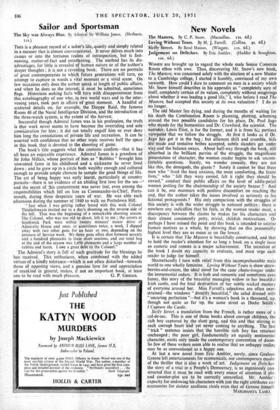New Novels
os. _6d.)
WOMEN are brought up to regard the whole male Senior Common Room ethos with awe. Thus, discovering Mr. Snow's new book, The Masters, was concerned solely with the election of a- new Master to a Cambridge college, I started it humbly, convinced of my own unworth. How could I dare to comment on men in a society which Mr. Snow himself describes in his appendix as " completely sure of itself, completely certain of its values, completely without misgivings about whether it was leading a good life," I, who before I read The Masters, had accepted this society at its own valuation ? I do so no longer. • The old Master lies dying, and during the months of waiting for his death the Combination Room is planning, plotting, scheming around the two possible candidates for his place, Dr. Paul Jago who stands for the humanities and Dr. Crawford, the scientist. The narrator, Lewis Eliot, is for the former, and it is from hL,-. partisan viewpoint that we follow the struggle. At first it looks as if Dr. Jago bois got it in the bag ; but alliances shift and crumble, bids are made and tentative bribes accepted, subtle slanders get under way and the balance sways. About half-way through the book, still absorbed in the brilliant parties of the struggle, the magnificent presentation of character, the woman reader begins to ask uncom- fortable questions. • Surely, we wonder uneasily, they are not like this, the demigods, the giants.? Surely it cannot be that these men who " lived the least anxious,. the most comforting, the freest lives," who " felt they were envied, felt it right they- should be envied," conduct their public affairs on the level of addlerpated women jostling for the chairmanship of the society bazaar ?- And can it be, one murmurs with positive discomfort on reaching the end, that the author takes the issues involved as seriously as .his fictional protagonists-? His only comparison with the struggles of this society is with the wider struggle in national politics ; there is nowhere any inditaton that 'he feels, as the woman reader must, a discrepancy between the claims he makes for his characters and their almost consistently petty, trivial, childish motivations. Or perhaps I have missed the point and this book is intended to satirise human motives as a whole, by showing that on . this presumably highest level they are as mean as on the lowest.
It is certain that The Masters is beautifully constructed, and that to hold the reader's attention for so long a book on a single issue so esoteric and remote is a major achievement. The intention of the book I doubt my capacity to evaluate, and must urge each reader to judge for himself.
Shamefacedly I turn with relief from this incomprehensible male world to one wholly feminine. Loving Without Tears is sheer-straw- berries-and-cream, the ideal novel for the cane chaise-longue under the immemorial cedars. It is lush and romantic and sometimes' even funny, this story of the beautiful managing widow in her beautiful Irish castle, and the final destruction of her subtle wicked mastery of everyone around her. Miss Farrell's adjectives are often river- strained—the windows " drearily :beautiful," the salad dressed with """uncaring perfection "—but it's a woman's book in a thousand, up, though not ,quite so far up, the same street as Dodie Smith's I Capture the Castle.
. Sicily Street,"a translation from the French, is rather more 'of a cul-de-sac. This is one of those books about corrupt children,' the rich boy captured by the slum gang, and this and that stirring in each corrupt heart and yet never coming to anything. The last " trick " sentence insists that 'the horrible rich boy has returned unchanged ; the poor girl, fundamentally an equally sentiment& character, exists only inside the contemporary convention of doom. So few of these writers seem able to realise that an unhappy ending may be as conventional as a happy one.
At last a new novel from Eric Ambler, surely, since Graham Greene left entertainments for ecumenicals, our contemporary master of the thriller that is also a work of art. Judgement on Ddtchev the story of a trial in a People's Democracy, is so ingeniously con- structed that it must be read with every ounce of attention if plc), and counter-plot are to be correctly unravelled. Mr. Ambler', capacity for endowing his characters with just the right attributes and accessories for sinister seediness rivals even that of Greene himself.
MARGHANITA LASKI.


































 Previous page
Previous page